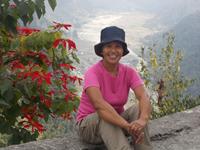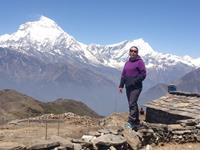Blog home / Female Guides Turning the Tide on Trekking
Traditionally the trekking industry has been the domain of men. Guides, assistant guides, kitchen crew and porter roles have long been filled predominantly by men. But the tides are turning as more women look to the great outdoors to become female guides in preference to office jobs.
The United Nations General Assembly declared 2017 as the "International Year for Sustainable Tourism for Development". This was a call for the travel industry to advance the contribution it makes to the three pillars of sustainability – economic, social and environment. Paying attention to the United Nations 17 Sustainable Development Goals, Goal #8 "Decent Work and Economic Growth", World Expeditions supports our local partners to employ more females in their offices and in the field.
We interviewed two of our female guides in Nepal to ask them about their journey into the trekking industry and what it is about their job they love so much.

Introducing Bal Kumari Mukhia
Born: 16th April 1966 | Country of origin: Darjeeling, India
I was interested in the trekking field from a very young age. I’ve always been drawn to outdoor adventures. In my younger years, I did not have guidance or a clear pathway to join the industry, but finally made my way into the industry at the age of 28.
The trekking industry in Nepal is historically dominated by men, do you think more females are becoming interested in this field?
Yes, more women are interested in joining the trekking industry in Nepal in recent years. However, it is still challenging to become a trek leader because it is against social norms. Many women, if they are interested, will not give it priority over family. I believe also that some women do not have the courage to guide a trek with both male and female clients for long periods.
How long have you been a trek leader with World Expeditions?
I have been a trek leader with World Expeditions for 8 years in total. Originally for 4 years and then I took a break to explore Australia, New Zealand and Japan, returning to World Expeditions in 2013 where I have stayed.
What are the most enjoyable parts of your job?
I enjoy meeting the amazing, brave, adventurous and intelligent people from all over the world. They exchange their experiences and knowledge. Most joy comes from sharing different parts of the country and feeling satisfied when they are happy. We exchange culture and I am very pleased when we see travellers return again and again. It was a real thrill when I have met an Australian lady who had summited Mount Everest and I realized that she had done her first trek in Nepal with me years before.
I encourage other women to join the trekking industry. It is a challenging but exciting path.
What qualifications did you complete to become a trek leader?
I completed High Altitude Training as well as Basic and Advanced Mountaineering Training. In 1997, I was a member of an All Women Rathong Peak Expedition in West Sikkim in India.
What field experience did you complete to become a trek leader?
I began as a co-leader for one year and completed my First Aid and Leadership training every year after that to become a trek leader.

Introducing Dawa Yangjin Sherpa (Karki)
Born: 30th September 1979 | Country of origin: Nepal Khumjung – 9/ Solu Khumbu
How long have you been a trek leader with World Expeditions?
I have been a trek leader with World Expeditions in Nepal for 5 years.
What field experience did you complete to become a trek leader?
Being from Portse village in the Everest region, trekking and adventure is in my blood. My father worked as a cook for trekking groups, and my brothers are Everest climbers. I used to hike with them from a very young age which was great experience for me to become a trek leader.
What qualifications did you complete to become a trek leader?
I have completed many qualifications including a Bachelor’s Degree in Education, English For Foreign Language Course (EFL) from United Kingdom (Barnet College), German Language Advanced Course, First Aid, Rescue training from Austria, and I have completed four Wilderness Medicine and Leadership Training courses operated by World Expeditions.
The trekking industry in Nepal is historically dominated by men, do you think more females are becoming interested in this field?
Although more women are interested in becoming a trekking guide in Nepal, it remains a challenge because it is hard to convince the family and society that a lady would work in trekking field.
I always encourage other women to join the trekking industry. It is very difficult for the new comers to get a chance without experience. Not everyone is able to come through the same steps into the industry as me.
What is the most enjoyable part of your job?
I love my job. I enjoy meeting new people from different countries and different backgrounds. I am getting more knowledge about the world through them as they share their stories, ideas, and knowledge. I love to show my clients my beautiful country, my Nepal. Most clients are spell bound by the multi dimensions of natural beauty and different types of people. I get much satisfaction sharing these things with my clients.